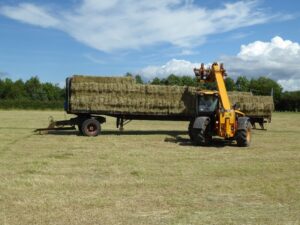 So another school year begins in the age of Generative AI, with the majority of students using AI for some purpose or other, no matter what faculty or institutions say. You can read Ian Bogost’s excellent piece in The Atlantic, or have an AI summarize it for you, or look to my own survey data from the past three years. We are in a new world, educationally, yet only now are be coming to terms with some of the effects of widespread cognitive offloading to AI.
So another school year begins in the age of Generative AI, with the majority of students using AI for some purpose or other, no matter what faculty or institutions say. You can read Ian Bogost’s excellent piece in The Atlantic, or have an AI summarize it for you, or look to my own survey data from the past three years. We are in a new world, educationally, yet only now are be coming to terms with some of the effects of widespread cognitive offloading to AI.
Our metaphor implies moving something to another place, the way I offload bales of straw from my pickup’s bed into our barn. Intellectually, however, cognitive offloading means letting something else perform a mental task. We have all done this: the calculator and map application on one’s phone perform jobs once done by hand and on paper.
I had tried a simple Web search to locate first use of the term. Not having any luck, I turned, naturally, to ChatGPT 5, a model I find works far better than earlier iterations. Here’s my prompt:
I’m curious to know when and where the term “cognitive offloading” was coined. If you can provide a source I can check, all the better. Thanks.
The reply was succinct and included links I checked for accuracy:
Earliest formal introduction: The term appears prominently in academic literature in a 2016 publication by Elisabeth F. Risko and colleagues. Their work explicitly defined cognitive offloading as “the use of physical action to alter the information processing requirements of a task in order to reduce cognitive demand.”
In a review or conference-style piece published around the same time, Risko noted that the term had long existed conceptually among cognitive scientists—but was rarely investigated empirically until then.
A 2016 article authored by E. F. Risko also reiterates the definition and situates cognitive offloading within a growing trend of interest in embodied, embedded, extended, and distributed cognition.
I recommend public-access sources here and here for readers who want to learn more directly, instead of cognitively offloading the work to an AI.
Learning takes time; I partner with AI to learn more, but I don’t lean too heavily on its reasoning.
Similarly, I still prefer paper maps as well as memorizing directions through experience; I even try alternative routes to help me understand the road-grid. I do use apps to plan trips, but when driving I tend to leave them off until the route becomes very complex (and you will also rarely find me on the Interstates, as I despise them). But I’m a map-geek who taught topographical-map reading when I was in military school. I do, however, love letting a machine shoulder the drudgery of multiplying or dividing numbers.
When it comes to more subtle and creative tasks, however, I grow concerned.
Like the person who only travels by map-app and finds it gives bad directions, what happens when the AI we rely upon makes mistakes we do not check? And longer term, what mental abilities may atrophy from cognitive offloading, and how, frankly, can one get back home again afterward?
Those remain unanswered questions of enormous consequence.
Send words and metaphors my way by e-mailing me (jessid -at- richmond -dot- edu) or leaving a comment below. Want to write a guest entry? Let me know!
See all of our Metaphors of the Month here and Words of the Week here.
Creative-Commons Image source: Geograph. That’s about four years worth of straw at our place, and I have loader-envy.